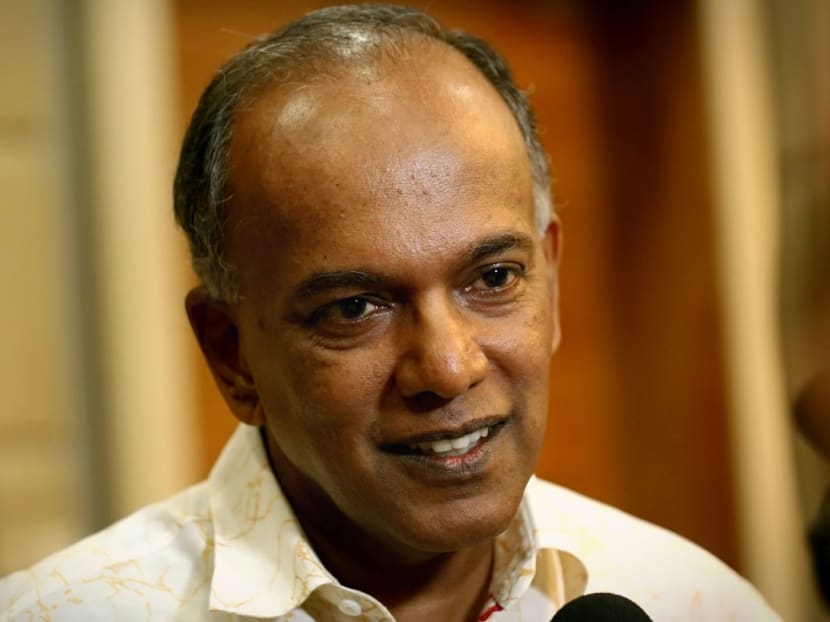Youth self-radicalisation a concern: Shanmugam
SINGAPORE — Expressing concerns over youth falling prey to extremist ideologies, Home Affairs Minister K Shanmugam on Tuesday (Mar 13) revealed that the Singapore authorities have picked up five radicalised teenagers — aged between 17 and 19 — over the past three years.

Expressing concerns over youth falling prey to extremist ideologies, Home Affairs Minister K Shanmugam on Tuesday (Mar 13) revealed that the Singapore authorities have picked up five radicalised teenagers — aged between 17 and 19 — over the past three years. Photo: Nuria Ling/TODAY
SINGAPORE — Expressing concerns over youth falling prey to extremist ideologies, Home Affairs Minister K Shanmugam on Tuesday (Mar 13) revealed that the Singapore authorities have picked up five radicalised teenagers — aged between 17 and 19 — over the past three years.
“These are lives wasted...We have to rehabilitate them quickly and get them back, to give them the opportunities,” said Mr Shanmugam, who was speaking at the Religious Rehabilitation Group’s (RRG) annual retreat lunch.
He noted that a “common trend” among the radicalised youth was a “heavy reliance” on the Internet and social media for information, including religious teachings. This meant that it would make it easier for terrorist groups operating on social media to “infect others with their propaganda”, Mr Shanmugam said.
With their “weak religious foundations” and poor understanding, the youths are susceptible and may be “riled up to do something bad” after witnessing violence such as beheadings by terrorist groups, or after hearing words taken out of context. The task for everybody — including the government, the RRG and the Islamic Religious Council of Singapore (Muis) — is to try to get this group to go to mosques, “to get them to listen to our preachers, get them to understand what Islam is all about”, Mr Shanmugam reiterated.
Meanwhile, the RRG will be launching a new initiative to engage Muslim youths aged between 16 and 25, and give them proper guidance.
Expected to start next month, the RRG awareness programme for youth — which comprise a series of lectures — will cover topics such as Islamic values, appreciating diversity in Islam, Muslims living in a plural society, and how to resist the influence of radical and extremist ideologies.
Said Mr Shanmugam: “The fight against extremism is really the fight for the hearts and minds of our young people. It is a fight to preserve our way of life, the fabric of our multi-religious, multi-racial society.”
Speaking to reporters, RRG vice-chairman Mohamed Ali said the new programme would seek to steer youths towards a “traditional process where teacher and student meet together to impart knowledge”, so that they could turn to more “reliable sources” instead of the Internet.
Dr Mohamed reiterated in his speech at the event that without a strong foundation in religious knowledge, young people are “unable to discern correct Islamic teachings espoused from traditional sources, from misconstrued ideals imparted from the likes of Islamic State of Iraq and Syria”. Youths here also need to understand the importance of “contextualising Islamic thoughts and practices ”, especially in a multi-racial and multi-religious society, he said.
“They also need to internalise the importance of moderation, tolerance, respect and appreciation of diversity and differences,” he added.
In his speech, Mr Shanmugam emphasised the RRG’s crucial role in public outreach, and stressed that “inoculation is the best preparation to prevent radicalisation”.
With the RRG going online and keeping its content fresh and current, young people looking for religious knowledge would be able to find it as a “legitimate source” instead of being attracted to extremist sites.
Apart from youth, Mr Shanmugam also highlighted a concern with the growing numbers of radicalised foreign workers who have been arrested under the Internal Security Act. “They get arrested, say after a year, they go back with debt, and they (and their families) are ruined... It is a terrible tragedy at a basic level…. So we have to try to help them,” he said.
He lauded the RRG’s efforts to reach out to foreign workers, be it through training imams who have been approved by Muis to deliver sermons in foreign worker dormitories or working with mosques to engage foreign domestic workers at risk of being radicalised.
Mr Shanmugam pointed out that an individual “doesn’t wake up one morning… and say, ‘Today I am going to go and kill people.’” The radicaliation process used to be longer, but now sometimes it is shorter, he noted. Examining the conditions behind the radicalisation process, Mr Shanmugam warned against an “exclusivist and divisive approach”, and laid out the Government’s task of promoting greater integration in society.
“We want to try to move away from the ‘us versus them’ mentality common to terrorist groups… The RRG… can promote the need for moderation, for respecting and celebrating the diversity in the world… and strengthening the bonds of understanding between different races, different religions,” said Mr Shanmugam.
Putting matters into perspective, he noted that Singapore does not have a problem with self-radicalisation when compared with the likes of Europe. “Maybe we have under detention, 30 to 40 people at most… But I would like to move towards zero tolerance in the sense that hopefully we succeed so well that the Internal Security Department does not have a job,” he quipped.
To date, only a quarter of the self-radicalised individuals caught since 2007 have been released.
In comparison, close to 90 per cent of former Jemaah Islamiyah members who were detained have been rehabilitated and reintegrated into society, said Mr Shanmugam. He noted the lower success rate with self-radicalised individuals, given the more “complex and psychological issues” to tackle.
“They hold on to their beliefs, (and) have a very limited understanding of Islam and absorb whatever they see on the Internet,” he said. “We are still trying to develop the right tools to deal with them and help them understand where they have gone wrong.”






